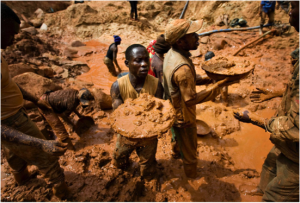by Savannah Williams
Four years after the creation of the ‘conflict mineral’ section of the Dodd Frank Act, what has been accomplished?
Background
In 2010, Congress passed the Dodd Frank Act as a response to the financial meltdown of 2008, in an effort to promote financial stability, accountability and transparency in the United States. Section 1502 however, has seen much debate around its effectiveness in promoting the above goals. This section requires U.S. companies to disclose their use of conflict minerals including tantalum, tin, tungsten, and gold.
The concern is that profits from these minerals have been fueling violent conflict in the Democratic Republic of the Congo (DRC) for years and measures need to be taken to bring an end to the on-going humanitarian crisis. It wasn’t until 2012 that the SEC issued the final rule on the actual requirements for implementation and the law did not come into effect until 2013.
Opposition
There was much opposition to the law for two main reasons. The first is the cost U.S. companies would incur for the required investigation and due diligence. According to the Securities and Exchange Commission (SEC), the cost of implementation was estimated to be between $3 and $4 billion dollars for the initial startup and between $207 and $609 million annually thereafter.
The second reason was that the SEC had no background or expertise in these matters. Many folks argued that there was no way to be sure that the bill would in fact help the situation in the DRC and could potentially make things worse.
Was it Effective?
While Section 1502 was intended to combat the human rights abuses in the DRC, it is a long way from a solution. Four years later, while progress arguably has been made, violence and gross violations of human rights persist. Due to the complexity of determining the origins and involvement of conflict resources and the fear of being pinned as a supporter of the violence, many companies and consumers have resorted to a general boycott of such minerals from the DRC region.
While rebels in the area are known to use slaves in the mining of these minerals, there is still a large population involved in artisanal mining as a source of income. This de facto embargo has led to a loss of livelihood for thousands of families. Immediate aid is needed for these families who are no longer able to pay for their children to go to school, are unable to provide food, and are still facing violence from rebel groups.
Additionally, violent groups have managed to find funding from other resources such as charcoal and marijuana, and many former miners have been forced to join armed groups because they have no other means of income.
Policies that are meant to help should not be created without substantial research and significant input from those who will be affected. In the case of Section 1502, policies were passed with little regard for the lack of infrastructure, and as a result impractical expectations became requirements. Many of the problems that developed may have been avoided if there had been a dialogue that included a wider range of Congolese involvement.
The idea that halting revenue from conflict minerals will end the violence is unrealistic. In fact there have been no lasting, significant decreases in violence that can be attributed to this policy. Arguably, it has not even had much success in reducing the conflict mineral trade. A coalition of Congo and Congolese experts wrote in an open letter regarding the Dodd Frank Act, “only a small fraction of the hundreds of mining sites in the eastern DRC have been reached by traceability or certification efforts“.
We must separate the two in the dialogue and policy creation process. The deep political issues and inequalities need to be addressed rather than simply taking away a portion of funding from violent groups. We must look at the Dodd Frank provisions as our responsibility to promote transparency and accountability but not as a solution to end the conflict in the DRC or anywhere that natural resources are used to fund violent groups.
As a global power, the United States has the responsibility to abstain from the illicit and violent conflict mineral trade, regardless of whether or not that will solve the problem in the DRC, and we should hold the government and corporations accountable. However, we must find a way to do so without hurting innocent people. The confusing and complex nature of Section 1502 has arguably caused more damage on the ground than it has helped.
We must now look for ways to mend the damage, such as providing jobs in mining communities that assist in the traceability process and spreading awareness of the unintentional but devastating effects of the de facto boycott of minerals from the DRC.
Savannah Williams is a Masters student and McCormack Scholar in the Department of Conflict Resolution, Human Security and Global Governance at UMass Boston. She has a BA in Psychology and Human Rights from the University of Connecticut.

